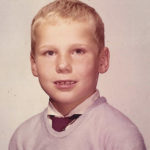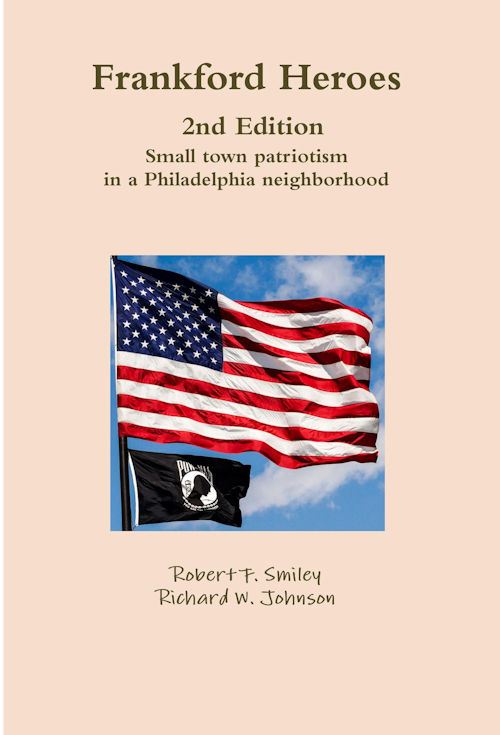
Peter J. Dawson, a long-time contributor to the Frankford Gazette, passed away on June 30th, after a long illness.
Pete lived in Mullica Hill, New Jersey but grew up in Frankford on Wakeling Street. He attended St. Martin’s grade school and Father Judge High School and then went on the graduate from St. Joseph’s University and Temple Law School.
You may have known him personally or only met him through his stories that we published over the years. He wrote about growing up in Frankford during the 50s and 60s and he recorded that era in a unique way, capturing the look and feel and smells and even the accents he encountered.

Pete at St. Martin’s
He had both a devotion to his Catholic Faith and yet an open mind about everything that you rarely find in one individual. I met him at first when he was on the Frankford Ghost Tour. He was one of those people I enjoyed talking to because you could never anticipate what he was going to come up with. He had an unfettered mind that is the mark of true genius.
Pete is survived by his wife, Rise’ (nee Sobel), sons Joshua and his wife Elaine, Reid, and Jeremy Dawson, stepdaughters Nancy (nee O’Connor) Doughty, and Melissa (O’Connor) Siegel and grand-children Jacob Siegel, Rebecca Siegel, Andrea Doughty and Bernard Dawson, and 4 brothers and 4 sisters and 18 nieces and nephews.
The following is one of his most popular stories from 2011.
The Terrifying Railroad Staple Machine Guns
One of the centers of kid activity in Frankford in the 1960s was “The Lot,” the tract of ground between Rutland Street, Foulkrod Street, Castor Avenue and Harrison Street. Back then, a railroad track ran along the top of the embankment on the Castor Avenue side of “The Lot”, from a small bridge at the Castor Avenue/Harrison Street corner to a small bridge spanning Foulkrod Street between Castor and Rutland. In that era, small freight trains still used the track to carry goods in box cars down to what was left of industrial activity down in the Kensington and Allegheny area.
In the early 1960s, the tennis courts you see there today did not exist. Instead, along Harrison Street, there was just a large open field where we used to play touch or tackle football.
Between the open field and the railroad embankment was the section known as “The Weeds”, the real center of our collective juvenile attention. The area called “The Weeds” was comprised of a vast, dense forest of the tallest, greenest-smelling ragweed you ever encountered, punctuated by chouchun trees, that invasive tropical looking species with woody stems from China, Ailanthus altissima, seen growing everywhere in urban areas these days, which we called “bow-and-arrow trees” because that is what we used to make out of them.
We walked trails and tunnels through the ragweed forest which took us to interesting piles of debris dumped in the weeds by contractors, and to the “forts” we dug into the ground and covered-over with contractor debris.
On the other side of “The Lot” was the large, neat organic garden of hardworking Old Man Schepis, and beyond that “The Garages,” the complex of rented brick garages fronting on Rutland Street near Foulkrod, whose walls can be seen to be collapsing inward today.
We used to don our sneakers, and yell to our parents on Saturdays, “Mom! Dad! We’re going to go play at ‘The Lot’!” And then we would go down there and manufacture bows and arrows and build forts and set-off homemade explosives in holes (to ensure that shrapnel shot upwards, not sideways). We weren’t very safe. But, we survived.
There was a lot of World War II army surplus in Philly in those days. Dennis and Daniel Grassi, who used to live up on Large Street, would show up with an astonishing array of genuine surplus weaponry (all rendered inoperable before sale) — M-1 rifles, Browning Automatic Rifles with bipod legs to support the barrel, a bazooka, hand grenades and, on one occasion, a Thompson machine gun with the circular ammo container.
Everyone wanted to hold the Thompson. Nowadays, someone carrying such items in public in our terrorism-sensitive society could not avoid arrest. Back then, the owners of such an “arsenal” were the envy of every kid in Frankford. We would show up at “The Lot” with our Army surplus weaponry, try to talk the Grassi boys into a trade for the day, and stage wars. A few of us would always reluctantly consent to being Nazis.
We loved climbing the embankment up to the railroad tracks. Before hang gliding became an American “thing”, we tried like the dickens to achieve flight from the top of that embankment, with homemade fixed wings and giant kites. One of us kids — one of the guys from St. Martin’s School on Oxford Circle, I don’t remember exactly who — broke his leg in one of the crash landings. We never achieved flight. But we were happy.
The biggest thrill of all was stupidity multiplied by a hundred — hiding in the weeds along the railroad tracks, as close as possible to the railroad trains thundering by a few feet away, without being seen.
The reason why getting close to the train without being seen was a big thing in those days had nothing at all to do with the very real danger being run over by a freight train. It was because of a rumor going around among the kids that railroad trains along that freight line were manned with cruel “railroad police” armed with frightening “staple machine guns” that could shoot out staples in a machine-gun-like fashion at kids caught playing near the trains.
The rumor was that railroad personnel had a kind of “license to staple,” and would cover us with painful staples, legally, at the drop of a hat.
Once I was over at Grassi’s with Den and Dan and I heard Mrs. Grassi warn her sons about the railroad police with their staple guns. Aghast, I thought, “So! It’s true!”
When first one kid and then another courageously crawled into the weeds next to the tracks while a freight train passed, and then came back without being stapled, he was a hero for weeks.
Finally, I did it, and I repeated the story of my bravado to friends while some of them stared at me open-mouthed. And I guess that used-up my allotted 15 minutes of fame.




